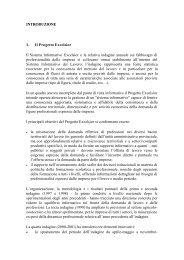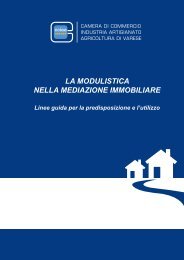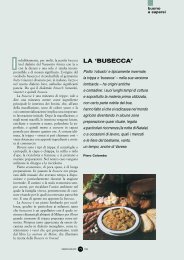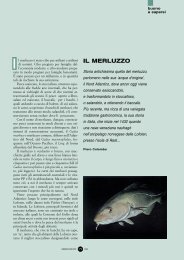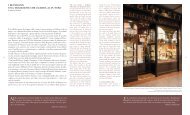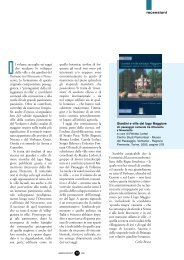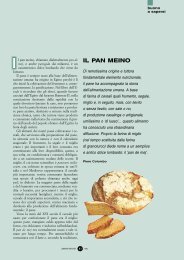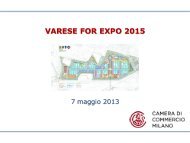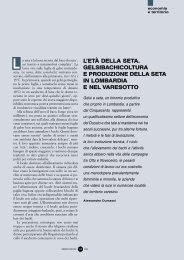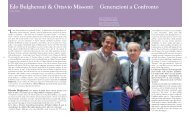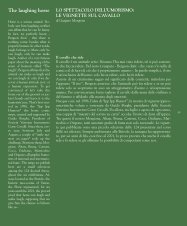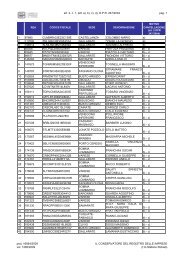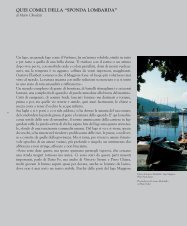outlet, un'idea made in varese - CCIAA di Varese
outlet, un'idea made in varese - CCIAA di Varese
outlet, un'idea made in varese - CCIAA di Varese
Create successful ePaper yourself
Turn your PDF publications into a flip-book with our unique Google optimized e-Paper software.
68<br />
Outlet, un’Idea Made <strong>in</strong> <strong>Varese</strong><br />
<strong>di</strong> Matteo Inzaghi<br />
Correva l’anno 1992, quando l’<strong>in</strong>segna “Freeport” apparve sul gigantesco deposito L<strong>in</strong>dt <strong>di</strong> Cassano Magnago, affacciato<br />
sull’autostrada Milano-<strong>Varese</strong>. L’<strong>in</strong>izio <strong>di</strong> una nuova era. Con il Freeport, sbarcava per la prima volta da noi il cosiddetto<br />
<strong>outlet</strong>: formula commerciale che, <strong>di</strong> lì a poco, avrebbe spopolato ovunque. All’orig<strong>in</strong>e <strong>di</strong> quella piccola grande rivoluzione<br />
c’era una vares<strong>in</strong>a, Cater<strong>in</strong>a Carletti, oggi docente universitaria <strong>in</strong> Svizzera e presidente del Chiostro <strong>di</strong> Voltorre.<br />
Lei ha <strong>in</strong>ventato l’<strong>outlet</strong> <strong>in</strong> salsa italiana…<br />
«Non ho l’abitud<strong>in</strong>e <strong>di</strong> attribuirmi il merito delle idee. Solo Leonardo Da V<strong>in</strong>ci era autorizzato a farlo. Diciamo che quella<br />
dell’<strong>outlet</strong> fu un’<strong>in</strong>iziativa che costruii <strong>in</strong>sieme ad altre persone, con le quali con<strong>di</strong>videvo <strong>di</strong>versi obiettivi. C’era un’opportunità,<br />
rappresentata dal grande spazio che si affacciava sull’autostrada dei laghi. Era un semplice deposito L<strong>in</strong>dt, ma molti consumatori<br />
credevano si trattasse <strong>di</strong> una fabbrica <strong>di</strong> cioccolato. Giocando sull’attrattiva del luogo, pensammo <strong>di</strong> <strong>in</strong>serirvi un punto<br />
ven<strong>di</strong>ta basato su una serie <strong>di</strong> atipicità: un’ampia rosa <strong>di</strong> prodotti <strong>di</strong> marca, alimentari e non. Prezzi competitivi. Per <strong>di</strong>ventare<br />
clienti occorreva sottoscrivere una tessera. Si trattava, <strong>in</strong>somma, <strong>di</strong> un mix tra <strong>di</strong>versi concetti commerciali: un po’ cooperativa,<br />
un po’ spaccio, un po’ club d’acquisto. Il tutto arricchito da orari buoni per tutte le esigenze. Aperti f<strong>in</strong>o a tar<strong>di</strong>, sette<br />
giorni su sette. La formula ricordava quella dello “Shopperta<strong>in</strong>ment” americano: un po’ shopp<strong>in</strong>g e un po’ <strong>in</strong>trattenimento…».<br />
Una formula che piacque molto ai clienti e <strong>in</strong>golosì gli operatori, i quali presero spunto per operazioni simili. Qualche anno<br />
dopo, guarda caso, a Mendrisio nacque il FoxTown. Ciononostante il Freeport nel 2000, chiuse i battenti. Perché?<br />
«Alla L<strong>in</strong>dt servivano gli spazi occupati dal Freeport. E noi fummo costretti a traslocare. Ci serviva un’area piuttosto ampia<br />
(circa 4 mila metri quadrati). Avviammo <strong>di</strong>verse trattative sul territorio, ma non riuscimmo a trovare neanche un accordo.<br />
Nessuno ci voleva, <strong>in</strong>somma. Perciò, così come era nato, da un giorno all’altro, il nostro <strong>outlet</strong> sparì…».<br />
Possibile che il numero <strong>di</strong> clienti che il Freeport <strong>in</strong>tercettava non facesse gola a nessuno?<br />
«Accadde esattamente il contrario. Davamo fasti<strong>di</strong>o e la nostra chiusura fece contenti molti. La formula dell’<strong>outlet</strong>, oggi collaudata,<br />
ma allora poco conosciuta (almeno qui da noi), scatenò parecchie ansie. L’idea dello spaccio venne vista come un<br />
attacco frontale al commercio tra<strong>di</strong>zionale. Un pregiu<strong>di</strong>zio che il Freeport - spazio attrattivo, multimarca e dall’<strong>in</strong>vi<strong>di</strong>abile<br />
fatturato - rispecchiava appieno. La realtà dei fatti, ovviamente, era, ed è tuttora, ben <strong>di</strong>versa. Gli stu<strong>di</strong> <strong>in</strong> proposito mostrano<br />
che le <strong>di</strong>verse formule <strong>di</strong>stributive possono <strong>in</strong>tegrarsi perfettamente. E c’è <strong>di</strong> più. Molti esperti fanno notare come siano stati<br />
proprio gli <strong>outlet</strong> a favorire il rilancio commerciale <strong>di</strong> molte aree, stimolando anche la piccola e piccolissima <strong>di</strong>stribuzione. Il<br />
motivo è semplice. La funzione dell’<strong>outlet</strong>, nei confronti del consumatore, è <strong>di</strong> tipo educativo. Grazie alla sua ampia scelta e ai<br />
prezzi scontati, questa formula commerciale conv<strong>in</strong>ce il cliente ad acquistare prodotti <strong>di</strong> marca cui, normalmente, gran parte<br />
delle persone non avrebbe accesso. Così facendo, l’<strong>outlet</strong> <strong>in</strong>genera nel consumatore una “cultura dell’acquisto” <strong>di</strong> cui beneficiano<br />
anche gli altri negozi della zona. E’ chiaro che, aff<strong>in</strong>ché il vantaggio sia davvero collettivo, occorre un adeguamento <strong>di</strong><br />
tutti gli operatori a uno standard qualitativo più alto».<br />
Oggi il commercio è profondamente cambiato rispetto ad allora…<br />
«E’ un’osservazione che mi costr<strong>in</strong>ge a cambiare casacca. Non parlo più come impren<strong>di</strong>trice, ma come docente universitario.<br />
Credo che l’avvento <strong>di</strong> <strong>in</strong>ternet abbia completamente stravolto il concetto <strong>di</strong> competitività e reso <strong>in</strong>utili le battaglie <strong>di</strong> retroguar<strong>di</strong>a<br />
che pretendono <strong>di</strong> tutelare il piccolo commercio dai gran<strong>di</strong> marchi. Oggi l’unico modo per restare sul mercato è scommettere<br />
e <strong>in</strong>vestire sulle proprie peculiarità, sulle proprie eccellenze. E spesso, chi ha davvero la possibilità <strong>di</strong> <strong>di</strong>fendere l’eccellenza,<br />
scarica la responsabilità dei propri fallimenti su altri. Oggi il commercio è uno dei pr<strong>in</strong>cipali volani <strong>di</strong> cui <strong>di</strong>spone un territorio.<br />
La politica dovrebbe sempre <strong>in</strong>serire la vocazione commerciale <strong>in</strong> un <strong>di</strong>segno strategico più ampio, capace <strong>di</strong> valorizzare e promuovere<br />
le attività commerciali presenti nei centri storici. Sarebbe un approccio lungimirante, sia dal punto <strong>di</strong> vista economico,<br />
sia da quello culturale e sociale. L’<strong>in</strong>vecchiamento della popolazione sta gradualmente restituendo alle città un elevato numero<br />
<strong>di</strong> anziani che preferiscono passeggiare, chiacchierare, e fare shopp<strong>in</strong>g, <strong>in</strong> centro. Ma l’onere non può gravare solo sugli amm<strong>in</strong>istratori.<br />
Gli stessi piccoli commercianti devono aggiornare la propria offerta. In term<strong>in</strong>i <strong>di</strong> orari <strong>di</strong> apertura, assortimenti, prezzi<br />
e così via. Non ultimo, è necessario che lo stesso consumatore impari a comprare meglio. Beppe Grillo sostiene che la politica si<br />
fa al supermercato. In parte è vero. Dalle scelte dei consumatori <strong>di</strong>pende gran parte dell’evoluzione dei nostri stili <strong>di</strong> vita».<br />
Prima ha citato <strong>in</strong>ternet. Se 10 anni fa la “rete” avesse avuto l’<strong>in</strong>fluenza che ha oggi, pensa che il Freeport avrebbe potuto<br />
cont<strong>in</strong>uare a la sua storia? Non più <strong>in</strong> uno spazio fisico, bensì on-l<strong>in</strong>e…<br />
«Be’, <strong>in</strong>izialmente qualcosa abbiamo anche venduto su <strong>in</strong>ternet. All’estero, per giunta. Ricordo che piazzammo un buon numero<br />
<strong>di</strong> gadget della Pallacanestro <strong>Varese</strong> ad alcuni clienti spagnoli. Dopo<strong>di</strong>ché, <strong>in</strong> effetti, la rete non aveva ancora il peso <strong>di</strong> oggi e,<br />
comunque, avremmo dovuto ripensare tutta la nostra formula. Molti dei nostri prodotti avevano bisogno <strong>di</strong> un contatto fisico da<br />
parte del cliente. Difficilmente si sarebbero accontentati <strong>di</strong> una foto sul pc…».<br />
Resta il fatto che il Freeport chiuse…<br />
«<strong>Varese</strong> deve superare la “s<strong>in</strong>drome del pasticc<strong>in</strong>o”. Quando si tratta <strong>di</strong> preparare dei dolcetti, siamo imbattibili e ne sforniamo<br />
a migliaia, uno più buono dell’altro. Abbiamo <strong>in</strong>vece delle <strong>di</strong>fficoltà a preparare una sola grande torta. Freeport fu una delle<br />
tante belle idee che nascono <strong>in</strong> questo territorio. Idee che, però, per crescere e affermarsi hanno bisogno <strong>di</strong> s<strong>in</strong>ergie, scelte<br />
con<strong>di</strong>vise e obiettivi comuni».<br />
69<br />
Ph. Paolo Zanzi
70<br />
It was <strong>in</strong> the year 1992 that the sign “Freeport” appeared on the wall of the big store<br />
L<strong>in</strong>dt of Cassano Magnago, just <strong>in</strong> front of the subway Milan-<strong>Varese</strong>. This was the<br />
beg<strong>in</strong>n<strong>in</strong>g of a new époque. Thanks to Freeport an <strong>outlet</strong> was opened for the first time,<br />
<strong>in</strong>augurat<strong>in</strong>g a commercial solution that rapidly became very successful everywhere. The<br />
author of this great revolution comes from <strong>Varese</strong>. Her name is Cater<strong>in</strong>a Carletti, now<br />
university professor <strong>in</strong> Switzerland and president of the Voltorre Cloister.<br />
You <strong>in</strong>vented the <strong>outlet</strong> <strong>in</strong> Italian style…<br />
«I am not <strong>in</strong> the habit of tak<strong>in</strong>g the cre<strong>di</strong>t for new ideas. The only one who could do it<br />
was Leonardo Da V<strong>in</strong>ci. I developed the idea of the <strong>outlet</strong> together with other people, with<br />
whom I shared several objectives. The big store situated <strong>in</strong> front of the subway<br />
(Autostrada dei Laghi) offered this opportunity. This was a simple L<strong>in</strong>dt store, but several<br />
customers thought it was a chocolate factory. We played on the attractiveness of its<br />
location and decided to open a po<strong>in</strong>t of sale based on several atypical elements, that is a<br />
wide range of branded products, food or not ones. The prices were competitive. You had<br />
to ask the card of the <strong>outlet</strong> to become its customer. In other words this <strong>outlet</strong> mixed<br />
several commercial concepts: It was a cooperative store, but also an <strong>outlet</strong> and a club for<br />
purchases. Besides the <strong>outlet</strong>’s open<strong>in</strong>g and clos<strong>in</strong>g times satisfy every type of need. It is<br />
opened till late, every day of the week. This <strong>in</strong>itiative rem<strong>in</strong>ded the American<br />
Shopperta<strong>in</strong>ment, that comb<strong>in</strong>ed shopp<strong>in</strong>g with enterta<strong>in</strong>ment…».<br />
This idea was particularly appreciated by customers, that were <strong>in</strong>spired by similar <strong>in</strong>itiatives.<br />
As chance would have it, some years later the <strong>outlet</strong> FoxTown opened <strong>in</strong> Mendrisio.<br />
In spite of this Freeport closed <strong>in</strong> 2000. Why?<br />
«L<strong>in</strong>dt needed the rooms used by Freeport. Therefore we had to move. We needed a wide<br />
area (about 4 thousand square metres). We entered <strong>in</strong>to negotiations with other subjects<br />
operat<strong>in</strong>g <strong>in</strong> our land, but we could not reach any agreement. In other words no one<br />
wanted us. Therefore as it opened the <strong>outlet</strong> rapidly <strong>di</strong>sappeared…».<br />
Why <strong>di</strong>d no one take <strong>in</strong>to account the high number of customers that Freeport<br />
could attract?<br />
«In fact no one considered it. We were a nuisance and a lot of people were happy when we<br />
closed the <strong>outlet</strong>. This latest formula is nowadays well-tested. But <strong>in</strong> that period it was not<br />
particularly known, especially <strong>in</strong> our land. Therefore it caused several worries. The <strong>outlet</strong><br />
was seen as a frontal attack to tra<strong>di</strong>tional commerce. With reference to its attractive and<br />
multi-branded space, as well as to its enviable turnover, this preju<strong>di</strong>ce reflected Freeport<br />
completely. In reality the situation was and still is very <strong>di</strong>fferent. Stu<strong>di</strong>es on the matter<br />
demonstrate that <strong>di</strong>fferent <strong>di</strong>stributive schemas can perfectly be <strong>in</strong>tegrated. Moreover many<br />
experts notice that the <strong>outlet</strong>s favoured the commercial re-launch of many areas, promot<strong>in</strong>g<br />
small and very small <strong>di</strong>stribution too. The reason is clear. The function of the <strong>outlet</strong> is to<br />
educate customers. Thanks to its wide choice and to its <strong>di</strong>scounted prices this commercial<br />
system <strong>in</strong>duces the customer to buy branded products, that are generally not accessible to<br />
many people. In this way the <strong>outlet</strong> develops a customers’ purchas<strong>in</strong>g culture, that gives<br />
benefits to the other shops of the area too. It is clear that the advantage can be collective<br />
only if all operators adapt to a higher qualitative standard».<br />
If compared with that period we can say that trade is now deeply changed…<br />
«This observation forces me to change my professional position. Now I do not speak as<br />
entrepreneur, but as university professor. In my op<strong>in</strong>ion Internet has completely changed<br />
the concept of competitiveness and <strong>made</strong> every rearguard effort be useless. I refer to those<br />
Outlet, a “Made <strong>in</strong> <strong>Varese</strong>” idea<br />
struggles aimed at protect<strong>in</strong>g small trade from notorious brands. Today the<br />
only way to rema<strong>in</strong> <strong>in</strong> the market is to bet and <strong>in</strong>vest <strong>in</strong> our peculiarities and<br />
excellences. In fact people that really have the possibility to protect the<br />
excellence often take the responsibility of their failures on the others.<br />
Nowadays commerce is one of the ma<strong>in</strong> weapons of a land. Politics should<br />
always <strong>in</strong>clude commercial vocation <strong>in</strong> a wider strategic plan, able to<br />
improve and promote the trade activities of the historical centres. This could<br />
be a far-see<strong>in</strong>g approach, both from the economic po<strong>in</strong>t of view and from the<br />
cultural and social one. Community’s age<strong>in</strong>g is gradually giv<strong>in</strong>g towns a high<br />
number of elderly people back, that prefer to go for a walk, to chat and to go<br />
shopp<strong>in</strong>g <strong>in</strong> the centre. But this task cannot bear only upon adm<strong>in</strong>istrators.<br />
Small traders have to update their offer too, as concerns open<strong>in</strong>g times,<br />
choice, prices and so on. F<strong>in</strong>ally it is necessary that the same customer<br />
learns to buy <strong>in</strong> a better way. Beppe Grillo affirms that politics is played <strong>in</strong><br />
supermarket. This is partly true. The evolution of our life-styles ma<strong>in</strong>ly<br />
derives from the choices of the consumers».<br />
You previously spoke about Internet. If ten years ago the web had the<br />
actual <strong>in</strong>fluence do you th<strong>in</strong>k that Freeport could survive? I do not refer to<br />
a physical reality, but to an on l<strong>in</strong>e space…<br />
«Well, at the beg<strong>in</strong>n<strong>in</strong>g we also sold someth<strong>in</strong>g through Internet. Abroad,<br />
<strong>in</strong> the barga<strong>in</strong>. I remember that we sold a good number of gadgets of <strong>Varese</strong><br />
Basketball Team to some Spanish customers. But after that we understood<br />
that the web had not the actual weight yet and however we should mo<strong>di</strong>fy<br />
all our system. Many of our items needed a physical contact with customers<br />
that could hardly be content to see a photo of the product on a web site…».<br />
But Freeport was closed…<br />
«<strong>Varese</strong> must w<strong>in</strong> its “petit four” syndrome. When we have to cook desserts<br />
we are unbeatable and we prepare thousands of sweets, one better than the<br />
previous ones. On the contrary we have <strong>di</strong>fficulties <strong>in</strong> prepar<strong>in</strong>g a big cake.<br />
Freeport was one of the wide range of ideas promoted <strong>in</strong> our land. However<br />
these ideas can improve and develop only with synergies, shared choices and<br />
common aims».<br />
Ph. Paolo Zanzi<br />
71



